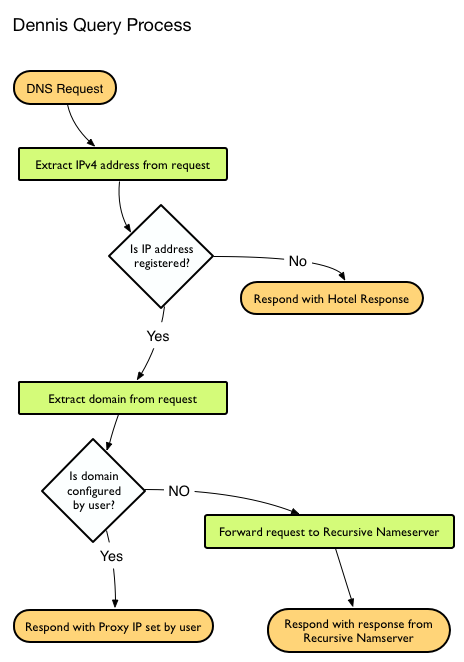Dennis the DNS Menace
Tailored DNS responses
Dennis is a DNS server which can serve customized DNS responses on a per user basis.
On its own Dennis isn't very useful but by adding a DNS recursor and a HTTP(S) proxy, Dennis can bypass geo-blocking for thousands of users.
How it works
Users are identified by their IP address, and each user can setup an unlimited number of custom DNS responses.
Setup
Requirements:
- Redis instance
- DNS recursor like PowerDNS (for test purposes you can use your ISPs or Google's DNS server)
- HTTP proxy like Nginx (To proxy HTTPS support for Server Name Indication, rfc6066, is required)
Build, configure and run Dennis.
-
Build Dennis, make sure you install the dependancies first:
$ go build dennis.go
-
Run Denis with a config file:
$ cat > dennis.conf
[main]
bind-addr = 127.0.0.1:8054
redis-addr = 127.0.0.1:6379
dnsfwd-addr = 127.0.0.1:8053
portal-addr = 127.0.0.1
logfile = /tmp/dennis.log
$ ./dennis -config dennis.conf
Running on 127.0.0.1:8054
bind-addr: bind Dennis to this address
redis-addr: address of the Redis instance
dnsfwd-addr: DNS server address for forwarding requests
portal-addr: this is the address unregistered users will get, works like a WiFi Portal
-
Create a test user identified by IP 127.0.0.1 and load it into Redis:
$ cat > data.txt
SET gateway:90d1ed58-399e-5ce9-93d8-28f0c86c80e0 53e48371-0bda-4f45-8d03-b0943c89c4ea
SET user:53e48371-0bda-4f45-8d03-b0943c89c4ea:domain:example.com. 1.0.0.1
SET user:53e48371-0bda-4f45-8d03-b0943c89c4ea:domain:example.org. 1.0.0.2
$ cat data |redis-cli --pipe
Format gateway:<uuid5.NAMESPACE_OID:ip> <str:user_id>
Format user:<str:user_id>:domain:<root_domain> <ip>
192.168.10.2 is the IP address of your HTTP proxy 1
192.168.10.3 is the IP address of your HTTP proxy 2
-
Test the setup and fire off some DNS queries with Dig:
$ dig @127.0.0.1 -p 8054 example.com
...
example.org. 0 IN A 1.0.0.1
$ dig @127.0.0.1 -p 8054 foo.example.org
...
foo.example.org. 0 IN A 1.0.0.2
Configuring Redis, Nginx and PowerDNS Recursor is out of scope for this document.
Security
Don't run Dennis on a privileged port, use firewall rules instead to make Dennis available on TCP & UDP port 53:
Redirect TCP/UDP traffic from external:53 to internal:8054
$ iptables -A PREROUTING -t nat -i eth0 -p tcp --dport 53 -j REDIRECT --to-port 8054
$ iptables -A PREROUTING -t nat -i eth0 -p udp --dport 53 -j REDIRECT --to-port 8054
Query Process

License
Dennis is licensed under the terms of the MIT license, see attached LICENSE file for more details.
 Documentation
¶
Documentation
¶